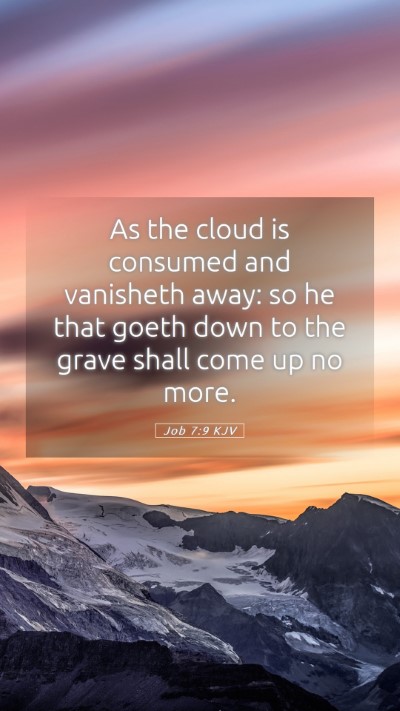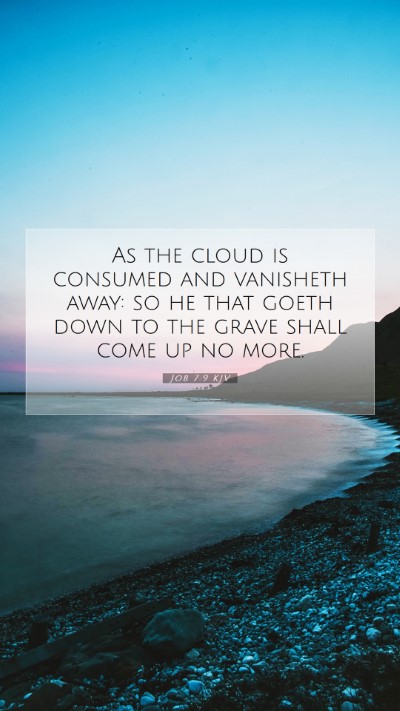Old Testament
Genesis Exodus Leviticus Numbers Deuteronomy Joshua Judges Ruth 1 Samuel 2 Samuel 1 Kings 2 Kings 1 Chronicles 2 Chronicles Ezra Nehemiah Esther Job Psalms Proverbs Ecclesiastes Song of Solomon Isaiah Jeremiah Lamentations Ezekiel Daniel Hosea Joel Amos Obadiah Jonah Micah Nahum Habakkuk Zephaniah Haggai Zechariah MalachiJob 7:9 Meaning
What is the meaning of Job 7:9?
As the cloud is consumed and vanisheth away: so he that goeth down to the grave shall come up no more.
Job 7:9 Bible Verse Meaning
Understanding Job 7:9 - Bible Verse Commentary
Bible Verse: Job 7:9
Verse: "As the cloud is consumed and vanisheth away: so he that goeth down to the grave shall come up no more."
This verse from the Book of Job encapsulates profound themes of mortality, the fragility of life, and the nature of human existence. In exploring the meaning of this Bible verse, we delve into the insights provided by respected public domain commentaries.
Overview of Job 7:9
Job 7:9 clearly illustrates the certainty of death, drawing a parallel between the transitory nature of clouds and human life. In this intimate conversation with God, Job expresses his anguish and the feeling of hopelessness regarding life and death.
Bible Verse Interpretations
- Matthew Henry: Henry emphasizes the vanity of earthly pleasures and how swiftly life passes. He explains that just as clouds are visible for a short time and then dissipate, so too is human existence fleeting. Job recognizes the inevitable reality of death and the cessation of life's experiences.
- Albert Barnes: Barnes elaborates on the inevitability of death, suggesting that Job's lament reflects a deep understanding of how life ultimately leads to the grave. He posits that, like clouds that fade away, human beings have a predetermined path to death from which they cannot escape.
- Adam Clarke: Clarke notes that the cloud analogy signifies not only the transient nature of life but also the painful reality of death. He remarks on the emotional tone of the verse, highlighting Job's sorrow that life would end and the hope of resurrection appears futile in his current state of distress.
Significance of Job 7:9
The verse serves as a poignant reminder of the temporal quality of human existence. It invites readers to reflect on their lives and their mortality in an ever-changing world. The acknowledgment of death is central to the human experience, compelling one to search for deeper meaning and purpose.
Application of Job 7:9 in Daily Life
- Understanding life's fleeting moments can encourage individuals to make the most of their time.
- It inspires a sense of urgency in sharing love and kindness with others.
- Contemplation of mortality may bring individuals closer to faith or personal belief systems.
Cross References
- Psalms 90:3-6: "Thou turnest man to destruction; and sayest, Return, ye children of men." This passage echoes the themes of mortality and the brevity of life.
- Ecclesiastes 3:2: "A time to be born, and a time to die; a time to plant, and a time to pluck up that which is planted." This verse reflects on the cyclic nature of life.
- James 4:14: "For what is your life? It is even a vapour, that appeareth for a little time, and then vanisheth away." This New Testament verse reinforces the temporary nature of earthly existence.
Conclusion
Job 7:9 serves as a profound reminder of the inevitability of death and the passing nature of life. Through the insights of renowned commentaries, we gather a richer understanding of this scripture. In applying this understanding, we can gain valuable perspectives on how to live meaningfully within our finite time. Engaging with such biblical passages is vital for those participating in online Bible study, conducting Bible study lessons, or exploring Bible study resources.


